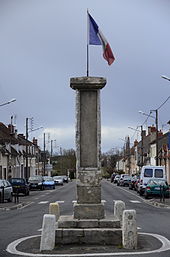Pocket money (1976)
| Movie | |
|---|---|
| German title | pocket money |
| Original title | L'Argent de poche |
| Country of production | France |
| original language | French |
| Publishing year | 1976 |
| length | 104 minutes |
| Rod | |
| Director | François Truffaut |
| script | François Truffaut, Suzanne Schiffman |
| production | François Truffaut |
| music | Maurice Jaubert |
| camera | Pierre-William Glenn |
| cut | Yann Dedet |
| occupation | |
| |
Pocket money (original title: L'Argent de poche ) is a French comedy film by François Truffaut from 1976. Everyday life in a small French town is told from the perspective of different children.
action

Martine stops in Allichamps , the geographical center of France , on the way to a holiday camp with her father . There she writes a postcard to her cousin Raoul. At Raoul's school in the small town of Thiers , his teacher Jean-François Richet noticed the postcard and included it in his lessons. While Mademoiselle Petit Molières' class is dealing with The Miser , a new student arrives. His name is Julien and he comes from a poor background. When Patrick, a student in his new class, goes home, he discovers that Julien is living in a shack.
Monsieur Richet moves into a new apartment with his pregnant wife Lydie. A neighbor comes home with her young son, Grégory, and discovers that she has lost her wallet. She leaves Grégory alone in the apartment and looks for her wallet in the stairwell. Meanwhile, Grégory climbs onto a windowsill with a cat. He pushes the cat out of the open window and eventually falls several stories down himself. As if by a miracle, he remains unharmed. When his mother sees him surrounded by worried passers-by, she faints.
Sylvie's parents, who have had two new goldfish, want to go out to eat with her in a restaurant. Sylvie insists on taking her favorite handbag, which her parents think is too old and dirty. Since the girl refuses to take another one, she has to stay at home. When her parents go to the restaurant, Sylvie takes her father's megaphone , who is the police superintendent, and calls out the window in the backyard that she is hungry. The neighbors notice her and offer her something to eat. Since Sylvie is locked in, two neighbors fill a basket with groceries and lower it to Sylvie's window via a rope.
When Julien is expelled from the classroom by his teacher because he doesn't have his textbook with him, he steals the money from his classmates' jackets in the corridor. Patrick, who lives alone with his father in a wheelchair, longs for female affection. Patrick goes to the cinema with his friend Bruno and two girls named Corinne and Patricia. While Bruno kisses Corinne and Patricia alternately, Patrick doesn't know what to do with the girls. He secretly loves the mother of his friend Laurent Riffle. One day he buys her red roses. However, Madame Riffle believes that Patrick's father wanted to give them to her and that Patrick is only the messenger.
A medical examination finally reveals that Julien is beaten and otherwise ill-treated at home. His mother and grandmother are subsequently arrested by the police. Julien is now to be placed with foster parents. Monsieur Richet, whose wife has since given birth to a boy, speaks to his students about Julien and tries to convey to them that child abuse is inexcusable. During the school holidays that followed, Patrick went to a summer camp, where he met Martine and got his first kiss from her.
background
Truffaut began working on a film project with children as early as 1972. The scene in which Patrick gives Madame Riffle flowers is based on the memories of Sacha Guitry ; other episodes have an autobiographical background. Also Federico Fellini's autobiographical film Amarcord has influenced Truffaut. Filming took place in Clermont-Ferrand , Bruère-Allichamps , Thiers and Vichy and lasted two months. Truffaut made a cameo in a blue shirt at the beginning of the film. His daughters Laura and Éva can also be seen in the film.
Pocket money premiered in France on March 17, 1976. The German premiere followed in June 1976 at the Berlinale , where the film took part in the competition for the Golden Bear . In 2003 the film was released on DVD.
Reviews
For the lexicon of international films , pocket money was an "autobiographical, light and charmingly narrated film, with extraordinary understanding and empathy for young people in their first phase of puberty". In short, Cinema found: “A charmingly narrated kaleidoscope of youth.” Kay Wenigers The film's large personal dictionary saw Truffaut's return “to a carefree childhood that I never experienced before”.
Awards
Pocket money received the Kansas City Film Critics Circle Award as Best Foreign Film and was nominated for a Golden Globe Award as Best Foreign Language Film . At the 1976 Berlinale , Truffaut's film took part in the competition for the Golden Bear , where it was awarded the Berliner Morgenpost readers' prize.
Web links
- Pocket money in the Internet Movie Database (English)
- Allowance at rotten tomatoes (English)
- Pictures of the film on cinema.de
literature
- Antoine de Baecque, Serge Toubiana: François Truffaut. Biography . vgs Verlagsgesellschaft, Cologne 2004 (2nd edition), ISBN 3-8025-3417-4 , pp. 525–527 (note p. 674).
Individual evidence
- ↑ Pocket money. In: Lexicon of International Films . Film service , accessed March 2, 2017 .
- ↑ cf. cinema.de
- ↑ Kay Less : The film's great personal dictionary . Volume 8, Berlin 2001, p. 65.